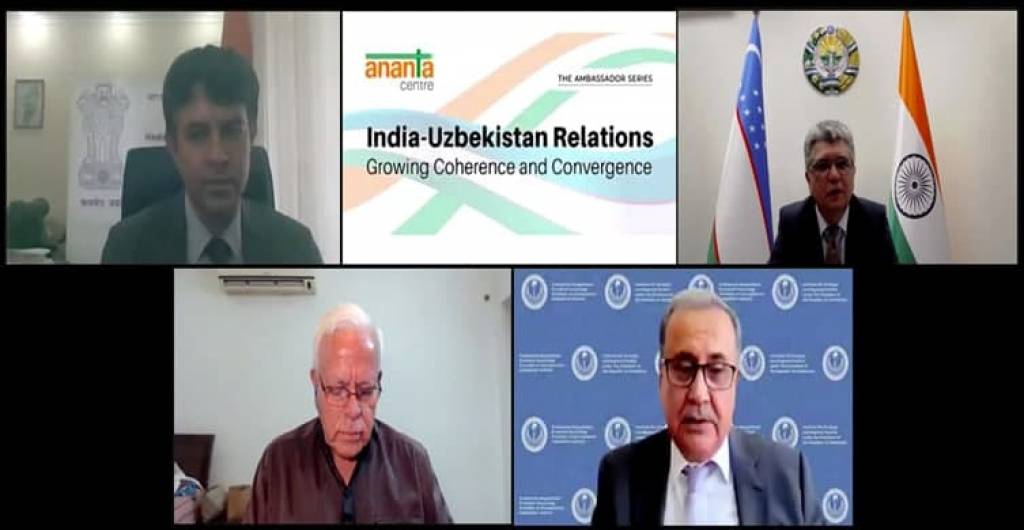ISMI expert: The past meeting in Tashkent to give an additional impetus to the development of new directions of Uzbek-Indian cooperation

The past meeting in Tashkent will give an additional impetus to the development of new directions of Uzbek-Indian cooperation. This opinion was expressed by the head of the department of the Institute for Strategic and Interregional Studies under the President of the Republic of Uzbekistan Alisher Kadyrov in his speech at a video conference on the state and prospects of development of Uzbek-Indian relations.
In his speech, the representative of the ISMI paid special attention to the main results of the past high-level international conference “Central and South Asia: regional interconnectedness. Challenges and Opportunities”, held in Tashkent on 15-16 July 2021.
According to A. Kadyrov, “the last forum aroused wide interest both in the region and in the international arena and became one of the largest international events held in the Uzbek capital over the past decades, where not only regional and world leaders, but also delegations from 44 countries and about 30 international organizations”. According to the participants of the conference, Uzbekistan has managed to create a high-level international political and expert platform for discussing security issues both on a regional and subregional scale in the light of the events in Afghanistan.
The conference became an important platform for discussing the issues of using the accumulated experience in the field of strengthening security through cooperation between the countries of Central and South Asia, as well as ways to solve existing and emerging problems and threats. This event can become a productive start of a serious interregional geopolitical and geo-economic process with the participation of all interested parties.
As the representative of ISMI noted, promoting socio-economic, energy, transport and communication projects and strengthening trade relations, Uzbekistan seeks to restore strong ties between the countries of Central and South Asia.
Discussions at the conference made it possible to reveal and substantiate the relevance of the initiative of regional interconnection between Central and South Asia in the context of modern world processes, the presence of common long-term interests of the countries of the regions.
“Expansion and promotion of interconnection, construction of trade and transit corridors between Central and South Asia represent an invaluable economic opportunity for two dynamically developing regions, as well as a path to the common prosperity of their peoples,” A. Kadyrov said.
Thus, the conference held is an important step in strengthening comprehensive intraregional and interregional ties.
As a result of the discussion of the issues brought up to the forum, a comprehensive analysis of the strategic opportunities and prospects of interregional cooperation, the remaining obstacles to the further development of interaction between the countries of Central and South Asia, was obtained.
An important result, in the opinion of the ISMI representative, was also the common opinion of the participants in the discussions on the situation in Afghanistan, who demonstrated their rejection of terrorism in any of its manifestations, the awareness of the disadvantages and futility of continuing the conflict in Afghanistan, the lack of alternatives to a political settlement and the willingness to contribute to the resolution of the Afghan crisis.
At the same time, A. Kadyrov believes, the main results of the past high event are in one way or another important for the further development of Uzbek-Indian relations. Tashkent and New Delhi can continue close interaction in various areas of bilateral relations of mutual interest, including issues of Afghan settlement, assistance in the socio-economic reconstruction of this country.
It is also necessary to strengthen and expand cooperation between the analytical structures of our countries to discuss security problems in the context of promoting inter-regional connectivity.
“I think that the last meeting will give another impetus to the development of new directions and forms of Indian-Uzbek cooperation and their comprehensive deepening,” the ISMI representative concluded.
The event, organized by the Ananta Aspen Indian Center together with the Embassy of the Republic of Uzbekistan in New Delhi, was attended by the Ambassador of Uzbekistan to India Dilshod Akhatov, Ambassador of India to Uzbekistan Manish Prabhat, as well as representatives of the political-forming and expert-analytical circles of the two countries. As part of the online dialogue, an exchange of views took place on the current state and prospects of Uzbek-Indian relations, specific proposals for the practical implementation of the potential of the two countries in various areas of cooperation were discussed.






